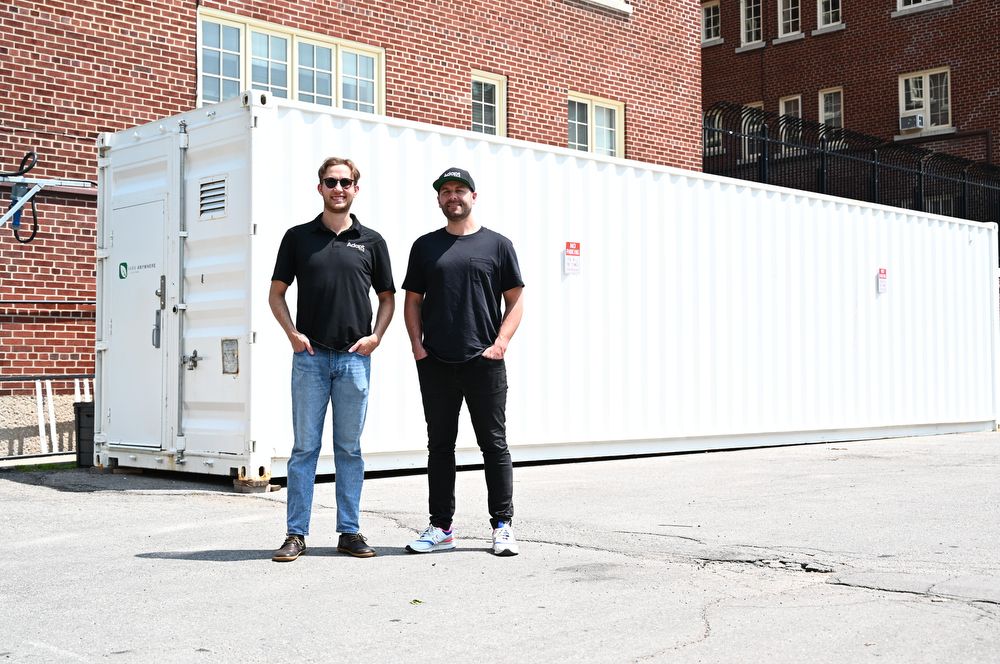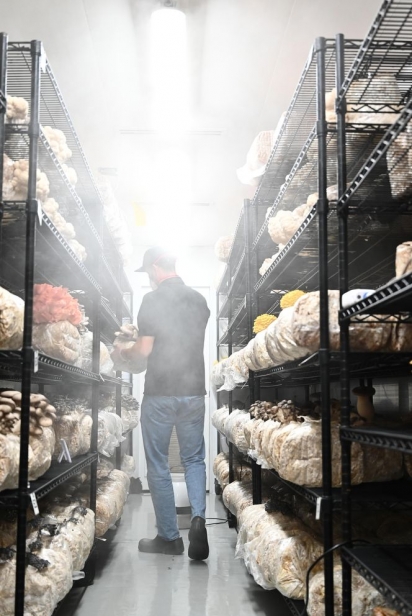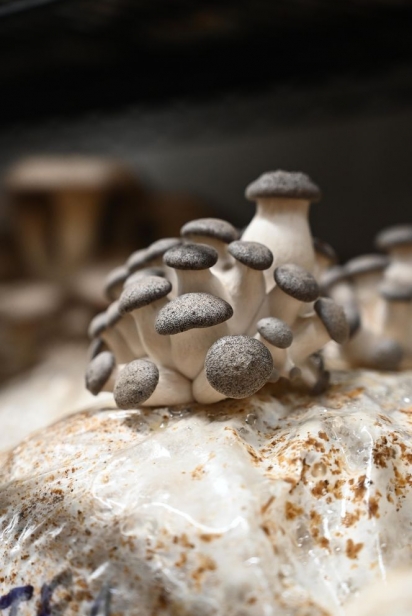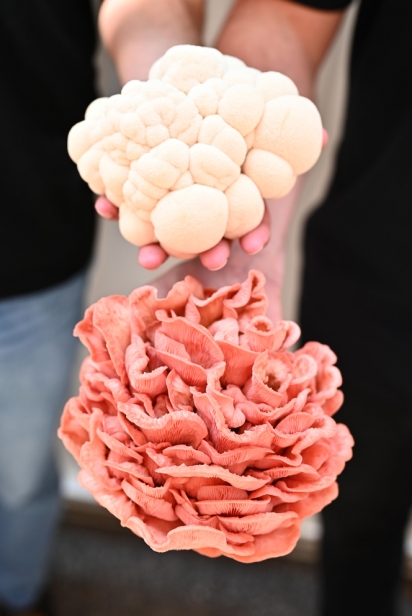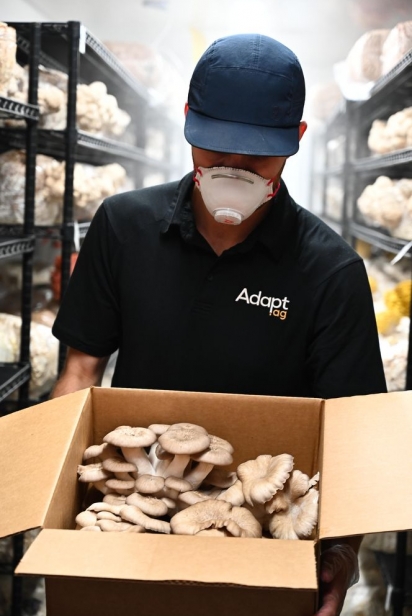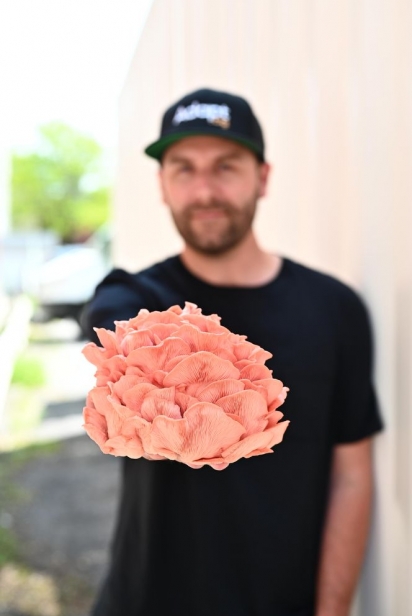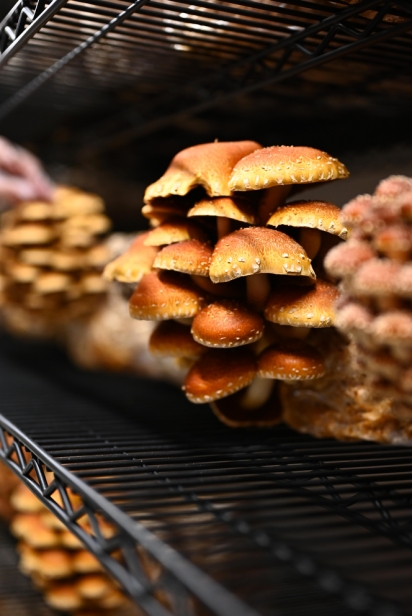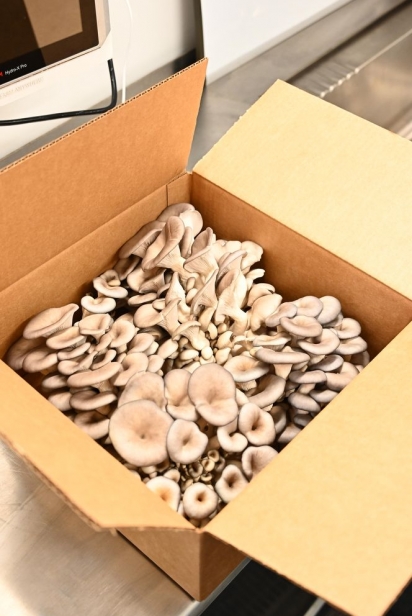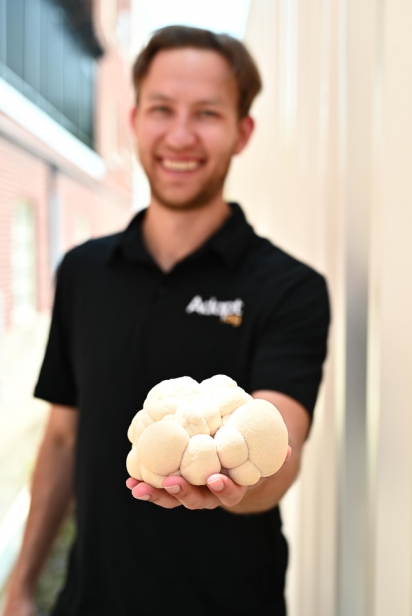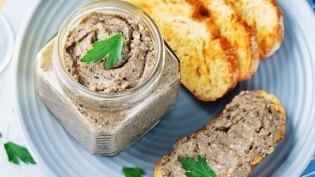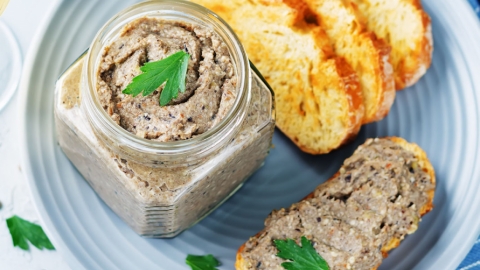There Grows the Neighbourhood
Sometimes life, or business, imitates mushrooms. Jonathan Murray set up Heartee on a hub-and-spoke model, which is how a lot of mushrooms grow. Also, like mushrooms, the business has grown quickly, from the planting of the seed of their idea (or the spore, in this belaboured metaphor) to starting actual operations.
“This took off a lot faster than we expected,” Murray says in an interview at Cocotte Bistro, one of two dozen Ottawa restaurants that now use Heartee’s “hyper-local” mushrooms on their menus.
Stephen La Salle is the chef who was excited to have a product grown so unexpectedly close to his restaurant, which is in the lobby of the Metcalfe Hotel just five blocks south of Parliament Hill.
“I mapped out the walk from the container to the restaurant to get the exact distance, which is why we refer to them as ‘550-metre mushrooms’ on our menu” says La Salle (who has since left Cocotte to become kitchen manager chef for SSP Canada at Ottawa airport).
The “container” is a nondescript, white, 40-foot shipping container that sits unobtrusively in a parking lot on MacLaren Street in downtown Ottawa. Inside are growingblocks from which sprout a gloriously colourful variety of mushrooms, all harvested by “farm operator” Dylan Mitchell and delivered daily to local restaurants and a growing list of grocery stores. The mushrooms couldn’t be fresher if restaurants grew them in their own basements.
So far there’s only one growing container in Ottawa, though more are planned, and Ottawa-based Heartee has others operating in Toronto, Kingston, Vancouver and Austin, Texas. The company will establish 16 more container “farms” by the end of the year, says Murray, the CEO.
“We know we're going to be putting them in Dallas, Chicago, Miami, Boston, Nashville and near Atlantic City, New Jersey,” he says. “We're probably going to be adding more containers in Ottawa, and we're adding more in Toronto.”
They’ll also be adding hubs in Calgary and Dallas. The hub for the Ontario region is in Kingston, where Heartee makes substrate growing blocks of sawdust and (ground) soybean shells, which are byproducts of healthy Canadian industries and are entirely compostable. (“They go to a farm and get turned into animal fodder, because there's lots of nutrients still in here for animals, mostly vitamins,” Mitchell says. “Mycelium is very rich.”)
Mycelium spores are injected into the blocks and shipped to container farms, where they’re tended by local operators, then harvested, packaged and delivered.
The containers, and the company, were conceived on the back of a napkin, literally, during an airport meeting between Murray, who’d spent 10 years in commission-only sales in medical tech, and Rob Imbeault, a former tech executive with an eye to angel investing.
“A month later, we had a design and production, and that was November 2021,” Murray says. “Then 2022 rolls around and we get our first prototype, which is the 20-footer we had in Ottawa. Demand kept growing. We brought Dylan on board and it took off, and we’ve got a 40-footer now here in Ottawa.”
Meanwhile, Heartee raised $4 million in venture capital to support expansion, and to get worldwide Global G.A.P. certification for agricultural standards.
The farms are company-owned. Farm operators get a base salary and a percentage of sales.
“As big as Dylan can grow the territory, he's going to share on the upside, forever,” Murray says. “The goal is to put Dylan and others in different cities in a position to grow their territory while we’re taking care of the business side on the back end. It's like we're trying to be [what] Shopify is to e-commerce, as opposed to [being] Amazon. To set up an online store before Shopify, you needed a web developer, you needed everything. Now it’s just plug and play.”
Because freshness is key, the spokes emanating out from the hub cannot reach further than where farm operators can deliver on a daily basis. “The product’s a lot better if it's fresher,” Mitchell says. “Being so hyper local, all the mushrooms that were harvested this morning were packaged and on the shelves within two hours, which is pretty crazy. In what world does the farmer harvest their product and walk it over to the grocery store?”
Like some other Heartee farm operators, Mitchell has a background in the cannabis industry, from which many modern agricultural-minded people escaped after burdensome regulation and an over-saturated market became an industry buzzkill.
“I pretty much put myself through school growing cannabis and throwing events,” Mitchell says. “It’s a pretty funny story, now that I look back at it. I’ve always been a self-starter, very into the environment, sustainable food systems, trying to tackle the many problems we face as a world. I just wanted to get into agriculture in general.”
The cannabis cultivation skills apply well to mushrooms. A visit to the container reveals the familiar masks, gloves and hairnets. Mushrooms require no watering or light, they need a constant temperature (approximately 17 C) and a humidity so high one's glasses immediately fog up.
It’s smaller and sleeker than a typical farm. Shelves line its narrow interior, with growing blocks neatly arranged. The blocks spend 10 to 14 days in the hubs before shipping to farms, where operators slice a small X into each bag to let in oxygen.
“As soon as they start getting oxygen, they start growing because mushrooms, unlike plants, need oxygen to breathe versus [carbon dioxide,]” Mitchell says. “They take in oxygen and excrete CO2, versus plants taking in CO2 and excreting oxygen, so it's totally opposite.”
Murray adds, “Mushrooms are closer in DNA to humans than they are like leafy green plants.”
Mushrooms are easily the most alien thing on your dinner plate. They can also be among the most beautiful, with their range of texture and colour. Lion’s mane mushrooms — “probably our most popular,” Mitchell says — are dense but soft and up close, they look and feel like a luxurious fabric. Blue oyster mushrooms have the colour of a late-dusk sky in summer, while other oysters cluster in a blast of flowery yellows. Pink oysters are a richly delicate hue one might see in a line of premium interior paints, likely with a name more aesthetically lofty than “container-mushroom pink.”
The mushrooms take 14 to 21 days to mature for harvest, and are delivered to many of Ottawa’s best restaurants and, more recently, to select Loblaws and other retailers. Heartee plans to be in 50 Loblaws stores in Ottawa and Toronto by Thanksgiving.
For home cooks, the Heartee YouTube feed has video recipes developed by Marcus Monteiro, executive chef at Laissez Faire and Locals Only in downtown Toronto.
Professional chefs are enthusiastic about the close-to-home produce.
“It's a pretty special thing when we can bring an ingredient into the kitchen and it gets the entire culinary team excited,” says La Salle, who at Cocotte used yellow oyster mushrooms in a vegan cassoulet. “It gets even better when we tell our guests that these were grown blocks from the restaurant and off-grid in a container.”
Jason Sawision, the chef/owner at Stofa, uses Heartee lion’s mane mushrooms in a lemon pasta dish. “The quality is really good,” Sawision says. “If that system of growing things in containers can be applied to other things, we could do a lot within the city limits, which is really cool.”
At Arlo, chef Jamie Stunt makes a lion’s mane mushroom “chop,” with steak spice, served with crispy potato pavé, creamed spinach and mushroom gravy.
“It’s incredibly meaty and satisfying and has quickly become one of our most popular dishes,” Stunt says. “I love that the mushrooms are grown just a block and a half from the restaurant. Dylan will often just walk them from the container to the restaurant. Doesn’t get any fresher or local than that.”
That intimate relationship with the supplier is fundamental to Heartee.
“It'll always be local,” Murray says. “That relationship that Dylan's making in Ottawa, that same dynamic exists in Toronto, Vancouver, Kingston, Austin, because he's in the community, he’s their grower. He’s not just a representative of someone 400 miles away.”
Heartee — the double “ee” is a nod to “environmental efficiency” and a commitment to sustainability — has global aspirations, but Murray understands that being part of the community is its, so to speak, substrate block.
“We've been donating hundreds of servings to the Parkdale Food Centre and community kitchens, and we're doing that same thing in every every market. We can sell to the top restaurants in the city and to higher-end grocery stores, [but] we’re also servicing people that maybe can't go to Riviera or the Rideau Club. A really important part of the ethos of the company is being able to do that as well.”
Heartee Foods
105 Schneider Rd., Unit 117, Kanata
hearteefoods.com | @hearteefoods


